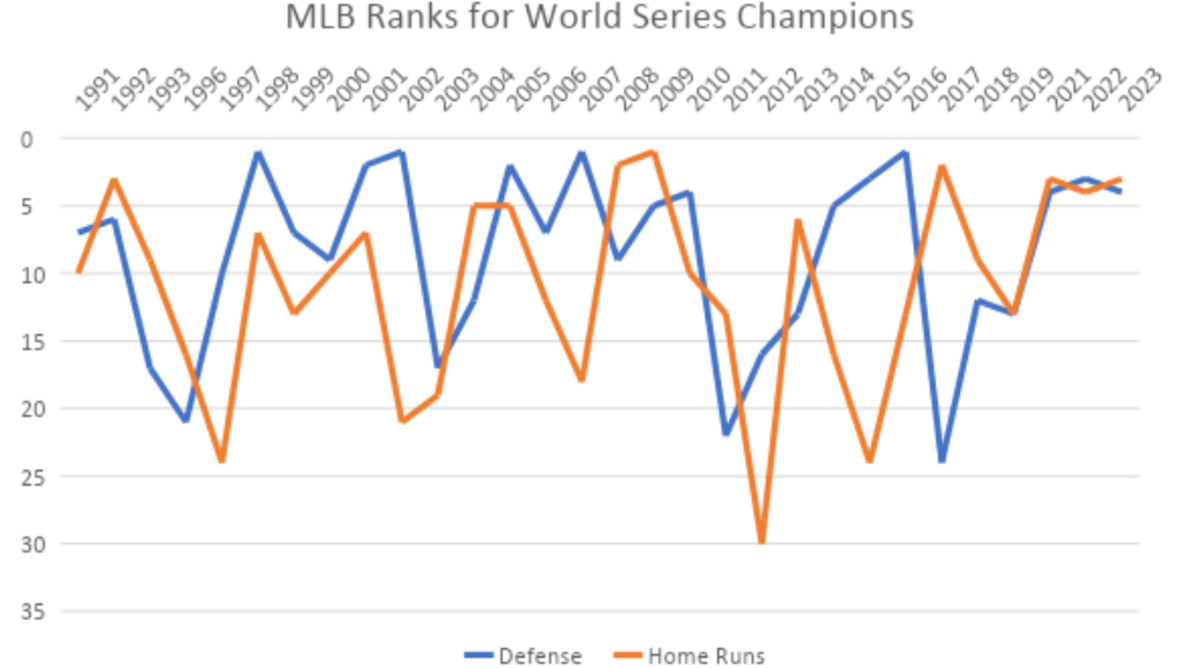Does Defense Actually Make World Series Champions?
Just two weeks before Opening Day, the Los Angeles Dodgers gerrymandered their middle infield again. The team that won 100 games last year with Miguel Rojas and Miguel Vargas as its most used shortstop/second base pairing switched to a Gavin Lux/Mookie Betts arrangement at the start of camp and now has reversed their roles because Lux could not throw reliably enough from shortstop across the diamond.
Suddenly the rest of the baseball world sees a vulnerability in the Dodgers. Betts is a fine all-around player who grew up playing shortstop, but he has started 12 major league games at shortstop. Lux missed last season with an ACL tear and is fighting physical and mental rust.
Vulnerable? Forget it.
The Dodgers will figure it out. They always do. In each of the past five seasons they have ranked first or second in MLB in defensive efficiency, the measurement of turning batted balls into outs. In that span, 11 players have started at shortstop for the Dodgers, with Corey Seager, Trea Turner, Rojas and Chris Taylor all getting at least 100 starts. Betts has simply got next. Rojas is insurance for Lux.
President of baseball operations Andrew Friedman is the top wizard in the game when it comes to marrying pitching and defense. His Tampa Bay Rays teams were the best at it in MLB during his years there and his Dodgers have been the best since he arrived in Los Angeles.

But just how important is defense, anyway, when it comes to winning a World Series championship? I looked at the past 30 World Series champions (full seasons only), figuring I would find defense as the secret sauce to winning it all. Only 13 of 30 champions finished in the top five in defensive efficiency.
Only two of those champions finished No. 1 in defensive efficiency and defensive runs saved: the 2002 Angels and 2016 Cubs, for whom Joe Maddon was bench coach and manager, respectively.
There have been plenty of below average defensive teams to win the title. Here are the worst of them by means of simply adding their ranks in two key categories, defensive efficiency (DE) and defensive runs saved (DRS):
Worst Defensive Ranks for Past 30 World Series Champions
DE | DRS | Total | |
|---|---|---|---|
1996 Yankees | 21 | 26 | 47 |
2011 Cardinals | 22 | 19 | 41 |
2017 Astros | 24 | 15 | 39 |
2003 Marlins | 17 | 18 | 35 |
2012 Giants | 16 | 18 | 34 |
Bear in mind defensive metrics are notoriously fickle. Whether you like defensive efficiency or defensive runs saved as your metric of choice, the four most elite defensive teams last season were the Milwaukee Brewers, Dodgers, Toronto Blue Jays and New York Yankees. They did not win a playoff game.
What has a bigger impact on winning: defense or hitting home runs? Would you rather build an elite defensive team or an elite home run hitting team? These breakdowns may surprise you:
Past 30 Full Season World Championship Teams
Avg. Rank | Top 10 | |
|---|---|---|
Defensive Efficiency | 8.6 | 20 |
Home Runs | 10.9 | 16 |
That’s big picture. What about the trendline of how the game is played today, with hitters looking to get the ball in the air and accepting more swing and misses to do so? The home run has gained tremendous importance as a predictor of a championship team.
Full Season World Championship Teams
Top Five in Home Runs | Avg. Rank | |
|---|---|---|
1991–2016 | 5 of 24 (21%) | 12.3 |
2017–2023 | 4 of 6 (67%) | 5.7 |
Here’s another look at answering the question of whether great defense or hitting home runs is a stronger component in winning it all. The chart shows where the past 30 world champions ranked in defensive efficiency and home runs:

What to make of this data?
- Over time, defense has been slightly more important, as you can see the blue line generally remains slightly higher than the orange one.
- But more recently, home runs win. The past seven full season champions ranked no worse than 13th in home runs.
- In today’s game, you better have both. Look at the far right of that chart: For the first time in this era, you see five straight champions who rank in the top half in defense and home runs, including an impressive current three-year run of the ’21 Braves (4, 3), ’22 Astros (3, 4) and ’23 Rangers (4, 3).
The ultimate caveat is that there is not one way to win a championship. Maybe today’s game doesn’t allow a champion such as the ’12 Giants, who hit the fewest home runs in MLB. And maybe the ’11 Cardinals were the ultimate fluky world champion (22nd in defense, 13th in homers). But to win it all you don’t adhere to a cookie-cutter approach. You develop a path to winning based on the personnel you have on hand.
As for the Dodgers, the spring training middle-infield carousel is more intriguing than worrisome. Their pitching, which heavily influences defense, is spectacular. And nobody should be worried about whether they will hit home runs. As hope builds among the other 29 teams that Los Angeles is vulnerable, just keep this run in mind:
Dodgers MLB Ranks
Defensive Efficiency | Home Runs | |
|---|---|---|
2023 | 2 | 2 |
2022 | 1 | 5 |
2021 | 1 | 4 |
2020 | 2 | 1 |
2019 | 2 | 4 |
Why choose defense or home runs when you can have them both?
